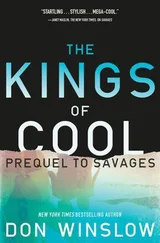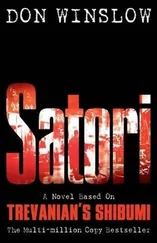He is an old undercover guy, so the slight trace of hesitation in her eyes tells him what he needs to know.
“Never mind,” Keller says. “I’m reassigning you.”
“Why?”
“Because I need someone I can trust,” Keller says. “Have your desk cleaned out by the end of day.”
He can’t afford to have a Howard loyalist screening his phone calls.
Not with Agitator going on.
Keller has kept knowledge of, and access to, Agitator on a highly select need-to-know basis, the intelligence on which is restricted to Blair, Hidalgo, and himself.
On the NYPD side, Mullen has laid his neck on the chopping block by running the op from his own desk, not informing his superiors or anyone else in the Narcotics Division except for one detective—Bobby Cirello, the cop who drove them around on the New York City heroin tour.
This was part of the “top-down/bottom-up” strategy that Keller and Mullen developed over their intense discussions. Cirello would be sent out to penetrate the New York heroin connection from the lowest level and work his way up. At the same time, they’d try to find an opening at the top of the financial world and work their way toward a connection between the two.
Agitator is a slow burn, it’s going to take months, if not years. Keller and Mullen have promised each other that they will make no premature arrests or seizures, no matter how tempting.
“We won’t pull the string on the net,” Mullen said, “until we have all the fish.”
Cirello is already on the street.
Finding a target in the financial world has taken longer.
They can’t put an undercover cop into the financial world, because the learning curve at the level they want would be too steep and it would take too long.
That means finding a snitch.
It’s ugly, but what they’re looking for is a victim. Like any predators, they’re scanning the herd to find the vulnerable, the injured, the weak.
It’s no different from finding an informer in the drug world, Keller thinks; you’re looking for someone who has succumbed to weaknesses or is in trouble.
The vulnerabilities always come in the same categories.
Money, anger, fear, drugs, or sex.
Money is the easiest. In the drug world, someone has received some dope on credit, then got it busted or ripped. He owes a lot of money he can’t pay. He flips in exchange for cash or refuge.
Anger. Someone doesn’t get the bump he wanted, the deal he wanted, the respect he thinks he deserves. Or someone screws someone’s wife or girlfriend. Or, worse, someone kills someone’s brother or friend. The aggrieved doesn’t have the power to extract his own revenge, so he goes to law enforcement to do it for him.
Fear. Someone gets word he’s on the list, his head is on the block. He has nowhere to run but to the cops. But he can’t come empty-handed, the law doesn’t give protection from the goodness of its heart. He has to come with information, he has to be willing to go back and wear a wire. Then there’s the fear of going to prison for a long stretch—one of the biggest motivations for ratting out. The feds used that particular fear to rip the guts out of the Mafia—most guys can’t deal with the fear of dying in the joint. There are the few who could—Johnny Boy Cozzo, Rafael Caro—but they’re few and far between.
Drugs. It used to be axiomatic in organized crime that if you do dope, you die. It makes guys too unpredictable, too talkative, too vulnerable. People do crazy, fucked-up things when they’re high or drunk. They gamble stupidly, they get into fights, they crash cars. And an addict? All you have to do to get information from an addict is to withhold the drug. The addict will talk.
And then there’s sex. Carnal misdeeds are not such a big deal in the drug world—unless you screw someone’s wife, girlfriend, daughter, or sister, or unless you’re gay—but out in the civilian world, sex is the undefeated champion of vulnerabilities.
Men who will confess to their wives that they cheated on their taxes, embezzled millions, hell, killed somebody, won’t cop to something on the side. Guys who make sure their buddies know that they’re players—that they have girlfriends, mistresses, hookers, high-priced call girls—would practically die before letting those same buddies find out that they don the girlfriends’ lingerie, the mistresses’ makeup; that the hookers and the call girls get a bonus for spanking them or pissing on them.
The weirder the sex, the more vulnerable the target is.
Money, anger, fear, drugs and sex.
What you’re really looking for is a combo plate. Mix any of the five and you have a guy who is on the fast track to being your victim.
Hugo Hidalgo takes a cab from Penn Station to the Four Seasons Hotel.
He spends most of his time in New York now, because that’s the new heroin hub and because, in the words often attributed to bank robber Willie Sutton, “That’s where the money is.”
Mullen is waiting for Hugo in the sitting room of a penthouse suite.
A guy in his early thirties, Hidalgo guesses, sits on one of the upholstered chairs. His sandy hair is slicked straight back, although a little disheveled as if he’s run his hands through it. He’s wearing an expensive white shirt and black suit pants, but he’s barefoot.
His elbows are on his knees, his face in his hands.
Hidalgo is familiar with the posture.
It’s someone who’s been caught.
He looks at Mullen.
“Chandler Claiborne,” Mullen says. “Meet Agent Hidalgo from DEA.”
Claiborne doesn’t look up, but mumbles, “Hello.”
“How are you?” Hidalgo says.
“He’s had better days,” Mullen says. “Mr. Claiborne rented a suite here, brought up a thousand-dollar escort, an ounce of coke, got shall we say ‘overexcited,’ and beat the hell out of the woman. She, in turn, called a detective she knows, who came up to the room, saw the coke and had the good career sense to call me.”
Claiborne finally looks up. Sees Hidalgo and says, “Do you know who I am? I’m a syndication broker with the Berkeley Group.”
“Okay …”
Claiborne sighs, like a twenty-year-old trying to teach his parents how to use an iPhone app. “A hedge fund. We have controlling interest in some of the largest office and residential building projects in the world, over twenty million square feet of prime property.”
He goes on to name buildings that Hidalgo knows, and a bunch he doesn’t.
“What I think Mr. Claiborne is trying to indicate,” Mullen says, “is that he’s an important person who has powerful business connections. Am I representing that correctly, Mr. Claiborne?”
“I mean, if I didn’t,” Claiborne says, “I’d be in jail right now, wouldn’t I?”
He’s a cocky prick, Hidalgo thinks, used to getting away with shit. “What’s a ‘syndication broker’ do?”
Claiborne is getting comfortable now. “As you can imagine, these properties cost hundreds of millions, if not billions of dollars to finance. No single bank or lending institution is going to take that entire risk. It takes sometimes as many as fifty lenders to put together a project. That’s called a syndicate. I put syndicates together.”
“How do you get paid?” Hidalgo asks.
“I have a salary,” Claiborne says, “mid–seven figures, but the real money comes from bonuses. Last year it was north of twenty-eight mil.”
“Mil would be millions?”
Hidalgo’s DEA salary is $57,000.
“Yeah,” Claiborne says. “Look, I’m sorry, I did get carried away. I’ll pay her whatever she wants, within reason. And if I can make some sort of contribution to a policemen’s fund, or …”
“I think he’s offering us a bribe,” Mullen says.
Читать дальше












